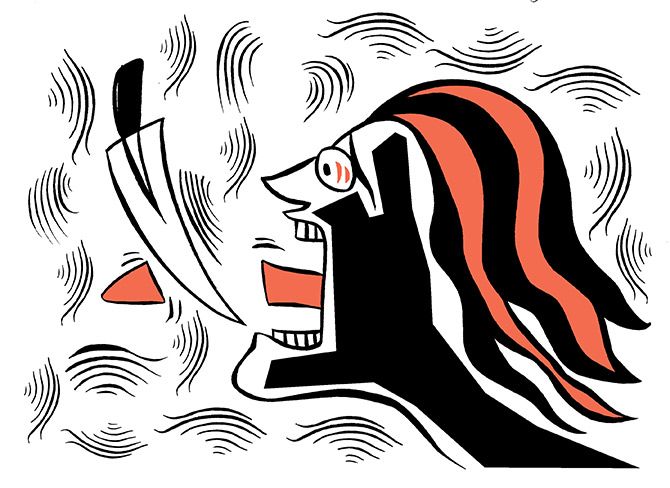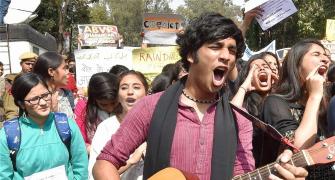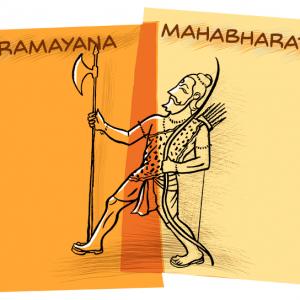What drove Ravana, a good king, and Duryodhana, who could match Bhima on strength and valour to ruin?
Arrogance, points out Arundhuti Dasgupta.
Illustration: Uttam Ghosh/Rediff.com

Speaking truth to power has always been perilous.
Never more so now than before it would seem, given the death of a journalist who took political leaders to task, the ordeal of two women to put a rapist spiritual leader behind bars and the daily ignominies being heaped upon people who dare to choose a narrative that deviates from those who wield power.
That power breeds arrogance is a universal given.
Ravana, a good king and a devout Shiva bhakt, was undone by his arrogance.
As was Duryodhana who could match his cousin Bhima on strength and valour and almost every other human trait.
But arrogance got the better of him, driving him to ruin.
Power also breeds intolerance; it fosters disdain for all who have an opposing view or interfere with the ways of the powerful.
Numerous examples are found in ancient texts about angry sages and wilful gods who burnt rivals to cinders for minor transgressions.
But as is the case with all such narratives, the stories convey the point of view of one set of narrators.
However, folk traditions in all ancient cultures offered an alternative telling of the stories where the good deeds of Ravana or the compassion of Duryodhana were often subjects of admiration.
This was an indicator of the popularity of the stories and the characters; and the resilience of the prevalent cultural framework that did not fear the other side enough to stamp out all dissenting voices.
Storytellers, writers and poets have taken great liberties with the popular narratives of the epics in the past.
While Ram the hero turns into an avatar of Vishnu and a god in the larger national narrative; there are plenty of stories and songs (usually sung by women) about Ram as a cruel husband, a boastful king and an uncaring brother.
The existence of many versions or tellings of these stories served as useful counter-points to more popular narration of events and they also managed to create a way of life that was comfortable with diverse opinions.
The coexistence may not always have been harmonious, but it was not a case of 'My way or the guillotine'.
Interestingly, even the mainstream narratives were not blind to the inherent flaws in powerful heroic characters.
Some narratives gave heroes a back story and thereby justified their actions while others served up their life stories as warnings to future heroes.
Unfortunately, neither has knowing the past, nor having lived with many versions of the past, worked as an antidote against future tyrants. Especially powerful males, be they kings, priests or leaders in any field.
For example, there is a part historical, part mythical narrative popular in parts of Bengal about an astrologer of some renown called Varahamihira. He was regarded as the final word on astrological predictions and counted many kings from many distant regions among his patrons.
As he grew powerful, he grew arrogant and intolerant, but it so happened that he met his comeuppance in his daughter-in-law.
Her name was Khana and she turned out to be an even greater astrologer than him and soon people began seeking her out, instead of him.
Unable to bear this, he went up to his son and asked him to rein in his wife.
The punishment to be meted out for her arrogance at assuming a greater role than her father-in-law was that her tongue be cut.
And so Khana spent her life with a half stutter that was understood only by her husband. He went on to propagate her teachings that are popular among people in the region even today as Khanar vachan.
In ancient Greece, the poet Sappho was known for her erotic poetry. She wrote odes to many pagan goddesses, but the Church saw this as homo eroticism and burned her books many years after her death.
Sappho is perhaps one of the early victims of religious hegemony.
Power or the version that we live with today seems to hate dissent.
The powerful see any questioning or their authority as a sign of revolt.
Irony is that those in positions of power who unfailingly invoke the country's great past on every occasion tend to ignore the other great traditions of the region.
To quote the prime minister who recently held forth on the Indian tradition of samvad: 'Dialogue is the only way to cut through deep rooted religious stereotypes and prejudices,' he said in a video message in August 2017.
Unfortunately, the truth lies in the practice, not the preaching.










